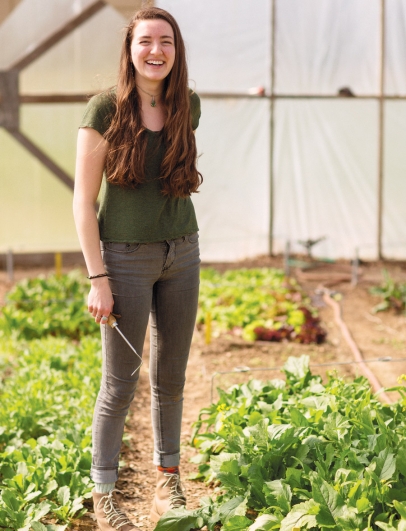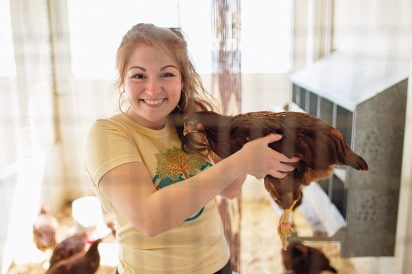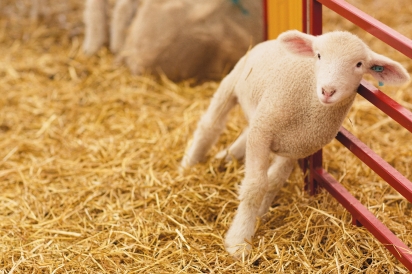Sustainable Agriculture and Food Systems at the University of Rhode Island
A New Concentration Offers Study in Sustainable Agriculture, Nutrition and Food
“Do you want to be a farmer?” More than one student enrolled in the University of Rhode Island’s (URI) new sustainable agriculture and food systems (SAFS) program has been asked that question by dubious family members or friends. Whether or not the students in the program foresee careers in farming, their enthusiasm—and that of their professors—about this interdisciplinary, interdepartmental and intercollege major is infectious.
“For many years, our students were asking to learn more about sustainability,” says Marta Gomez-Chiarri, SAFS coordinator and chair of URI’s Department of Fisheries, Animal and Veterinary Sciences. “When we decided to create this major, we realized that [all the necessary course material] was there; it was just in different departments and hard for students to find.”
SAFS emphasizes the intrinsic value of all food systems—whether created locally on a small scale or by multinational companies—while still emphasizing local food cultures and biodiversity. Robust course offerings, including biology, chemistry, Spaceship Earth and The Problem of Hunger in the U.S. and capstone courses in landscape architecture and in food systems, sustainability and health, allow students to focus on one of three options: sustainable agriculture, nutrition and food, or food and society, explains Gomez-Chiarri.
Spaceship Earth, for example, focuses on different areas of sustainability—transportation, energy, water, etc.—and attracts a diverse mix of students from SAFS and other disciplines, as well, which leads to cross-learning, says Norbert Mundorf, a communication studies professor. Spaceship Earth, he says, arose from an honors colloquium focused on making sustainability a campus-wide initiative.
“That’s the beauty of food: Food is a topic that goes beyond borders,” says Vanessa Garcia Polanco, a senior majoring in environment and natural resource economics, with a double minor in hunger studies and SAFS’s sustainable agriculture and food systems. Studying food sustainability, she says, can incorporate health, nutrition, social services, the environment or production. “There’s a place for food in everything we do, from molecular science to [public] policy.”
Approximately 20 students are already majoring or minoring in the new degree, and Gomez-Chiarri is optimistic that student interest will flourish. Nevertheless, educating the broader university community about SAFS and reassuring parents, who fear that SAFS may not offer their children paths to gainful employment, are part of her tasks.
Neither students nor faculty share such concerns about future employment. Students often think very narrowly; once they declare their major, that’s their sole focus, says Katherine Petersson, associate professor of animal and veterinary science. But SAFS exposes students to various perspectives across disciplines, says Petersson, so they gain critical thinking skills and global perspectives. In turn, that makes these students more well-rounded citizens and highly attractive to prospective employers. Says Petersson: “Even if you want an animal caretaking business, for example, you need to consider animal welfare, what you’re feeding the animals, where is that food coming from, how is that food being grown and what do your customers demand of you?”
“Sustainability … is the future … I’m not worried at all about employment,” asserts Stephanie Peramas, a junior with a double major in animal science and sustainable agriculture, whose post-graduation plans include working in a zoo setting and graduate school in California. “There are so many ways to incorporate sustainability into what you do—whether you are [discussing] feeding animals or feeding people,” adds Peramas.
“Bringing a focus on agricultural careers to New England is a good thing; we need to compete with ‘Big Ten’ schools in the Midwest that offer many agriculture-related majors,” says Garcia Polanco, a Rhode Island Food Policy Council member who is heavily involved with several URI sustainability initiatives. She plans to work in Rhode Island for a year or two before pursuing a graduate degree in policy, community development and agricultural education.
Nevertheless, lacking some societal shifts, Rebecca Brown, associate professor of plant sciences and entomology, acknowledges that choosing a farming career presents current challenges, such as limited access to land and health insurance and, down the road, no pensions or other retirement funds.
Peramas, vice president of URI Slow Food and president of the university’s Animal and Veterinary Science Club, is delighted that the interdisciplinary program enables her and her fellow students to develop a comprehensive, broad-based perspective on sustainable agriculture issues. In her Public Health Nutrition class, students discuss the significance of diverse food cultures. Peramas says, “If you want to be a registered dietician, you can’t tell someone not to eat certain foods; you need to be culturally competent and aware.”
For a course called The Problem of Hunger in the U.S., she’s examining the relationship between farmers’ markets, hunger and food insecurity in the United States.
Food insecurity is a topic that different professors address from their respective perspectives. “Food insecurity ties into sustainable agriculture … and climate change, population movements and crickets as a protein source,” says Peramas, who now feels knowledgeable discussing these issues with working professionals. People wouldn’t have talked about consuming crickets for protein five or 10 years ago, she says.
Although URI is blessed with farmland, greenhouses, fisheries and farm animals, including goats, chickens, cows, sheep and pigs, as well as vibrant aquaculture and fisheries programs, SAFS introduces students to a vast array of Rhode Island’s sustainability experts off-campus. Working field trips to such venues as Baffoni’s Poultry Farm, Boston Greens, Brandon Family Farm, Confreda Greenhouses & Farms, Daniele, Farming Turtles, Matunuck Oyster Farm and Rhode Island Mushroom Co., and intensive travel courses to Naples, Italy—to study the Slow Food movement—and Oaxaca, Mexico—to examine diverse food cultures—make the curriculum all the more meaningful. Together they provide an international perspective, says Gomez-Chiarra.
Elizabeth LaChapelle, a junior majoring in SAFS focusing on sustainable production, has gardened since she was a little girl. She loves her classes that have her growing hydroponic tomatoes and lettuce, and transplanting seedlings in URI’s greenhouse. Although the traditional image of farmers as “old white men” was once disconcerting, LaChapelle anticipates a career in urban or small intensive farming with no animal-derived products.
Given sustainable agriculture’s global aspects and President Donald Trump’s anti-immigration initiatives, students and faculty expressed concerns about the future of undocumented immigrants in the United States and how sustainable agriculture could be impacted by mass deportations. “I don’t think people realize the role of migrants in the food and farm systems,” Petersson says. “Dairy farms in northern New York are … losing good workers and even cranberry crops in Massachusetts rely on a lot of immigrant workers.”
Garcia Polanco’s honors project is a literature review of the food culture of Dominican immigrants in Rhode Island. Eager to learn more, she has queried the Rhode Island Food Policy Council: In what sectors of the food system—production, harvesting, hospitality—are immigrants, be they documented, undocumented or refugees? How could this knowledge benefit our food strategy and inclusivity in the food system?
“We need to not romanticize the career of a farmer, but rather … to make it a viable, real career path,” adds Garcia Polanco.







